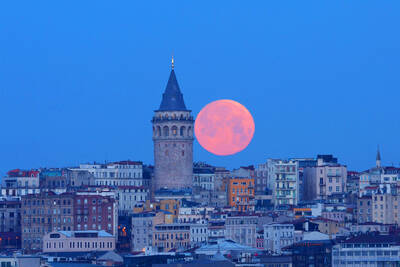Brazilian President Luiz Inacio Lula da Silva was in the Chinese financial hub of Shanghai yesterday, as he looks to boost ties with the South American nation’s biggest trade partner and win political support for attempts to mediate the Russian invasion of Ukraine.
Lula arrived late on Wednesday and is scheduled to meet Chinese President Xi Jinping (習近平) in Beijing today before concluding his visit tomorrow.
The sides are expected to sign at least 20 bilateral agreements during Lula’s trip, underscoring the improvement in relations following a rocky patch under former Brazilian President Jair Bolsonaro, the Brazilian government said.

Photo: REUTERS
In Shanghai, Lula would also attend the official swearing in of close adviser and former Brazilian president Dilma Rousseff as head of the Chinese-backed New Development Bank.
The institution posits itself as an alternative to the IMF and World Bank that are controlled mainly by the US and its Western allies.
It is focused on the so-called BRICS group of developing nations made up of Brazil, Russia, India, China and South Africa.
Established more than seven years ago, the bank has approved 99 loan projects totaling more than US$34 billion, mainly for infrastructure projects, the Chinese Ministry of Foreign Affairs said.
Much of that credit has gone to Brazil for projects such as a metro system in the business capital of Sao Paulo.
During his meeting with Xi, Lula is expected to discuss trade, investment, reindustrialization, energy transition, climate change and peace agreements, the Brazilian government said.
China is Brazil’s biggest export market, each year buying tens of billions of US dollars of soybeans, beef, iron ore, poultry, pulp, sugar cane, cotton and crude oil.
Brazil is the biggest recipient of Chinese investment in Latin America, Chinese state media reported, but Lula has spoken against outright Chinese ownership of Brazilian companies.
One of the agreements Lula would sign in China is for the construction of the sixth satellite built under a binational program that would monitor biomes such as the Amazon rainforest.
China recently ended a ban on Brazilian beef imposed in February following the discovery of an atypical case of mad cow disease.
Politically, Lula’s visit is a sign of Brazil’s reemergence in global relations since he replaced Bolsonaro in January.
Bolsonaro and members of his family sometimes caused friction with Chinese authorities on issues from the origins of the COVID-19 pandemic to telecommunications company Huawei.
Bolsonaro was an admirer of right-wing nationalists and showed little interest in international affairs or travel abroad.
Lula, who was scheduled to visit a Huawei research center in Shanghai yesterday, made trips to Argentina and Uruguay in January and the US in February, signaling the importance he gives to international affairs, experts said.
He toured the world during his first presidency from 2003 to 2010, and particularly in his second term, when he visited dozens of countries. He has visited China twice before.
A key piece of Lula’s foreign outreach is his proposal that Brazil and other developing countries, including China, mediate peace over Ukraine.
However, his suggestion that Ukraine cede Crimea as a means to forge peace has angered Kyiv and its closest backers.
China has also sought to play a role in ending the conflict, but in a manner highly supportive of Moscow. It has refused to condemn the invasion, criticized economic sanctions on Russia, and accused the US and NATO of provoking the conflict.
Russia and China declared a “no limits” relationship in a joint statement last year, and Xi reaffirmed the closeness of ties by meeting with Russian President Vladimir Putin in Moscow last month.
A Chinese peace proposal presented in February contains aspects in common with Lula’s, such as ceasing hostilities and starting negotiations, but says nothing about the return of Ukrainian territory seized by Russia and its separatist allies.

ANGER: A video shared online showed residents in a neighborhood confronting the national security minister, attempting to drag her toward floodwaters Argentina’s port city of Bahia Blanca has been “destroyed” after being pummeled by a year’s worth of rain in a matter of hours, killing 13 and driving hundreds from their homes, authorities said on Saturday. Two young girls — reportedly aged four and one — were missing after possibly being swept away by floodwaters in the wake of Friday’s storm. The deluge left hospital rooms underwater, turned neighborhoods into islands and cut electricity to swaths of the city. Argentine Minister of National Security Patricia Bullrich said Bahia Blanca was “destroyed.” The death toll rose to 13 on Saturday, up from 10 on Friday, authorities

RARE EVENT: While some cultures have a negative view of eclipses, others see them as a chance to show how people can work together, a scientist said Stargazers across a swathe of the world marveled at a dramatic red “Blood Moon” during a rare total lunar eclipse in the early hours of yesterday morning. The celestial spectacle was visible in the Americas and Pacific and Atlantic oceans, as well as in the westernmost parts of Europe and Africa. The phenomenon happens when the sun, Earth and moon line up, causing our planet to cast a giant shadow across its satellite. But as the Earth’s shadow crept across the moon, it did not entirely blot out its white glow — instead the moon glowed a reddish color. This is because the

DEBT BREAK: Friedrich Merz has vowed to do ‘whatever it takes’ to free up more money for defense and infrastructure at a time of growing geopolitical uncertainty Germany’s likely next leader Friedrich Merz was set yesterday to defend his unprecedented plans to massively ramp up defense and infrastructure spending in the Bundestag as lawmakers begin debating the proposals. Merz unveiled the plans last week, vowing his center-right Christian Democratic Union (CDU)/Christian Social Union (CSU) bloc and the center-left Social Democratic Party (SPD) — in talks to form a coalition after last month’s elections — would quickly push them through before the end of the current legislature. Fraying Europe-US ties under US President Donald Trump have fueled calls for Germany, long dependent on the US security umbrella, to quickly

Local officials from Russia’s ruling party have caused controversy by presenting mothers of soldiers killed in Ukraine with gifts of meat grinders, an appliance widely used to describe Russia’s brutal tactics on the front line. The United Russia party in the northern Murmansk region posted photographs on social media showing officials smiling as they visited bereaved mothers with gifts of flowers and boxed meat grinders for International Women’s Day on Saturday, which is widely celebrated in Russia. The post included a message thanking the “dear moms” for their “strength of spirit and the love you put into bringing up your sons.” It